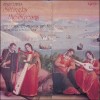Composers
Henry Lawes (5 December 1595 – 21 October 1662) was an English musician and composer.
He was born at Dinton, Wiltshire, and received his musical education from John Cooper, alias Giovanni Coperario. In 1626, Lawes was received as one of the Gentlemen of the Chapel Royal, and held the position until the Commonwealth put a stop to church music. On the Restoration in 1660, Lawes returned to the royal chapel, and composed an anthem for the coronation of King Charles II. He was buried in Westminster Abbey. He was the brother of William Lawes, also a composer.
Lawes published a collection of his vocal pieces, Ayres and Dialogues for One, Two and Three Voyces, in 1653. He followed it with two other books under the same title, in 1655 and 1658 .
Lawes's name has become known beyond musical circles because of his friendship with John Milton, for whose masque, Comus, he supplied the incidental music for the first performance in 1634. The poet wrote sonnet in which Milton describes the great merit of Lawes.
Lawes composed music (melody and unfigured bass) to Edmund Waller's poem "Go Lovely Rose". These are the song and the "Lawes" mentioned in the following line of Ezra Pound's poem "Envoi" which ends the first part of Pound's Hugh Selwyn Mauberley: Go, dumb-born book, tell her that sang me once that song of Lawes: Hadst thou but song as thou hast subjects known, then were there cause in thee that should condone even my faults that heavy upon me lie, and build her glories their longevity.
Recently Added
Biography
Henry Lawes (5 December 1595 – 21 October 1662) was an English musician and composer.
He was born at Dinton, Wiltshire, and received his musical education from John Cooper, alias Giovanni Coperario. In 1626, Lawes was received as one of the Gentlemen of the Chapel Royal, and held the position until the Commonwealth put a stop to church music. On the Restoration in 1660, Lawes returned to the royal chapel, and composed an anthem for the coronation of King Charles II. He was buried in Westminster Abbey. He was the brother of William Lawes, also a composer.
Lawes published a collection of his vocal pieces, Ayres and Dialogues for One, Two and Three Voyces, in 1653. He followed it with two other books under the same title, in 1655 and 1658 .
Lawes's name has become known beyond musical circles because of his friendship with John Milton, for whose masque, Comus, he supplied the incidental music for the first performance in 1634. The poet wrote sonnet in which Milton describes the great merit of Lawes.
Lawes composed music (melody and unfigured bass) to Edmund Waller's poem "Go Lovely Rose". These are the song and the "Lawes" mentioned in the following line of Ezra Pound's poem "Envoi" which ends the first part of Pound's Hugh Selwyn Mauberley: Go, dumb-born book, tell her that sang me once that song of Lawes: Hadst thou but song as thou hast subjects known, then were there cause in thee that should condone even my faults that heavy upon me lie, and build her glories their longevity.



